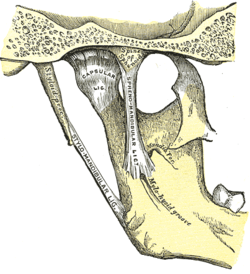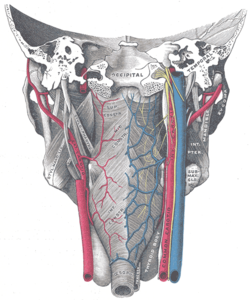Stylomandibular ligament
This article may be too technical for most readers to understand. (May 2021) |
| Stylomandibular ligament | |
|---|---|
 Articulation of the mandible. Medial aspect. (Stylomandibular lig. labeled at center left.) | |
 Muscles of the pharynx, viewed from behind, together with the associated vessels and nerves. (Styl. mand. lig. labeled at center left.) | |
| Details | |
| System | skeletal |
| From | styloid process (temporal) |
| To | ramus of the mandible |
| Identifiers | |
| Latin | ligamentum stylomandibulare |
| TA98 | A03.1.07.008 |
| TA2 | 1569 |
| FMA | 57083 |
| Anatomical terminology | |
The stylomandibular ligament is the thickened posterior portion of the investing cervical fascia around the neck. It extends from near the apex of the styloid process of the temporal bone to the angle and posterior border of the angle of the mandible, between the masseter muscle and medial pterygoid muscle. The stylomandibular ligament limits mandibular movements, such as preventing excessive opening.
Structure
[edit]The stylomandibular ligament extends from near the apex of the styloid process of the temporal bone to the angle and posterior border of the angle of the mandible, between the masseter muscle and medial pterygoid muscle. From its deep surface, some fibers of the styloglossus muscle originate. Although classed among the ligaments of the temporomandibular joint, it can only be considered as accessory to it.
Function
[edit]The stylomandibular ligament, along with the sphenomandibular ligament, limits mandibular movements, such as preventing excessive opening.[1]
Clinical significance
[edit]The stylomandibular ligament is important for maintaining stability of the mandible after maxillofacial surgery.[1]
References
[edit]![]() This article incorporates text in the public domain from page 298 of the 20th edition of Gray's Anatomy (1918)
This article incorporates text in the public domain from page 298 of the 20th edition of Gray's Anatomy (1918)
- ^ a b Beukes, J.; Reyneke, J. P.; Becker, P. J. (2013-01-01). "Medial pterygoid muscle and stylomandibular ligament: the effects on postoperative stability". International Journal of Oral and Maxillofacial Surgery. 42 (1): 43–48. doi:10.1016/j.ijom.2012.05.010. ISSN 0901-5027. PMID 22819693 – via ScienceDirect.
External links
[edit]- "Anatomy diagram: 25420.000-1". Roche Lexicon - illustrated navigator. Elsevier. Archived from the original on 2015-02-26.
